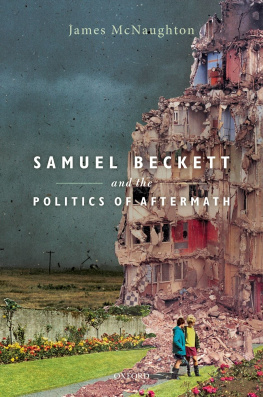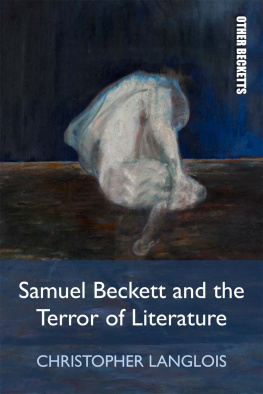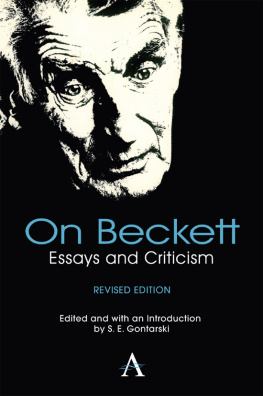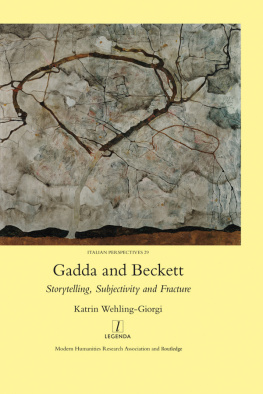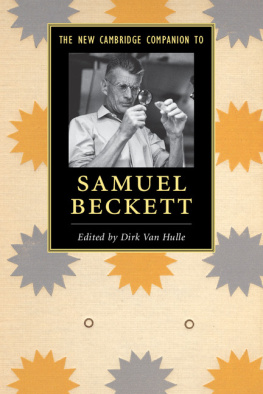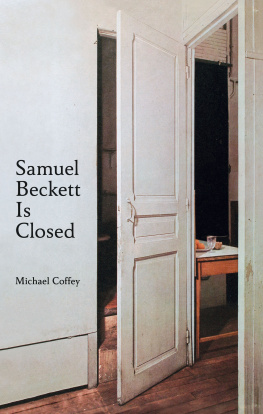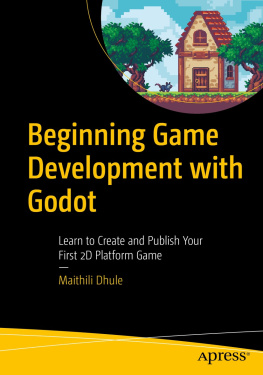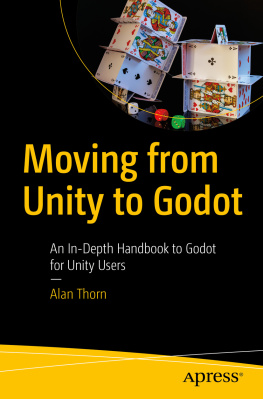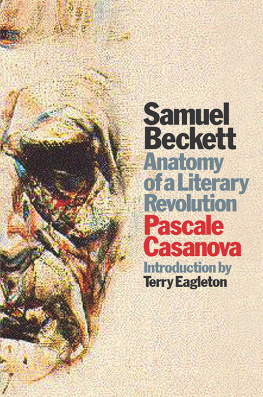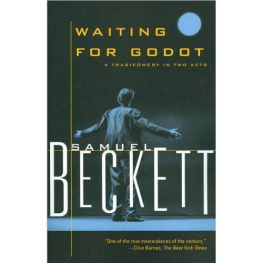Beckett Samuel - Reading Godot
Here you can read online Beckett Samuel - Reading Godot full text of the book (entire story) in english for free. Download pdf and epub, get meaning, cover and reviews about this ebook. City: New Haven;Conn, year: 2002, publisher: Yale University Press, genre: Science. Description of the work, (preface) as well as reviews are available. Best literature library LitArk.com created for fans of good reading and offers a wide selection of genres:
Romance novel
Science fiction
Adventure
Detective
Science
History
Home and family
Prose
Art
Politics
Computer
Non-fiction
Religion
Business
Children
Humor
Choose a favorite category and find really read worthwhile books. Enjoy immersion in the world of imagination, feel the emotions of the characters or learn something new for yourself, make an fascinating discovery.

- Book:Reading Godot
- Author:
- Publisher:Yale University Press
- Genre:
- Year:2002
- City:New Haven;Conn
- Rating:5 / 5
- Favourites:Add to favourites
- Your mark:
- 100
- 1
- 2
- 3
- 4
- 5
Reading Godot: summary, description and annotation
We offer to read an annotation, description, summary or preface (depends on what the author of the book "Reading Godot" wrote himself). If you haven't found the necessary information about the book — write in the comments, we will try to find it.
Waiting for Godot has been acclaimed as the greatest play of the twentieth century. It is also the most elusive. This book an illuminating introduction to Becketts work for general readers, students, and specialists approaches the play scene by scene, exploring the text linguistically, philosophically, critically, and biographically.
Reading Godot — read online for free the complete book (whole text) full work
Below is the text of the book, divided by pages. System saving the place of the last page read, allows you to conveniently read the book "Reading Godot" online for free, without having to search again every time where you left off. Put a bookmark, and you can go to the page where you finished reading at any time.
Font size:
Interval:
Bookmark:
READING GODOT
LOIS GORDON

Copyright 2002 by Yale University. All rights reserved. This book may not be reproduced, in whole or in part, including illustrations, in any form (beyond that copying permitted by Sections 107 and 108 of the U.S. Copyright Law and except by reviewers for the public press), without written permission from the publishers.
Designed by Rebecca Gibb. Set in Scala type by Keystone Typesetting, Inc. Printed in the United States of America by Vail-Ballou Press.
Library of Congress Cataloging-in-Publication Data
Gordon, Lois G.
Reading Godot / Lois G. Gordon.
p. cm.
Includes bibliographical references and index.
ISBN 0-300-09286-5 (alk. paper)
I. Beckett, Samuel, 1906-1989. En attendant Godot. I. Title.
PQ2603 .E378 E644 2002
842.914 dc21
2001006565
A catalogue record for this book is available from the British Library.
The paper in this book meets the guidelines for permanence and durability of the Committee on Production Guidelines for Book Longevity of the Council on Library Resources.
10 9 8 7 6 5 4 3 2 1
TO ALAN AND ROBERT
Acknowledging those who have helped me with my work on Samuel Beckett takes me back to graduate school when the Swift scholar Ricardo Quintana encouraged me to study Beckett. It is impressive, I think, that virtually everyone who had published on Beckett in those days still remains in the pantheon of Becketts most distinguished critics: Ruby Cohn, Martin Esslin, Raymond Federman, John Fletcher, and Hugh Kenner. After Beckett won the Nobel Prize, the scholarship flourished. The abundance of talented people studying the man and his work, then and now, remains imposing. I hope my notes and bibliography will serve as an acknowledgment of my respect for and gratitude to the many thoughtful scholars who have continued the lively Beckett dialogue over the years.
I owe special mention to a few whose work or advice has been particularly useful in this book. Martha Fehsenfeld and Dougald McMillan provided an excellent commentary on Becketts Regiebuch in Beckett in the Theatre. Their work on Waiting for Godot was based, -34 are courtesy of Martha Fehsenfeld.
It is my good fortune to have friends and colleagues who offered invaluable support and conversation, many of whose remarks about Beckett have remained with me over the years: Alec Reid, William York Tindall, Mel Friedman, Warren G. French, Laurence Wiley, Gottfried Bttner, Bernard Dick, Pauline Flanagan, Xerxes Mehta, Thomas Cousineau, Robert Levine, Ilene Engelmayer, Charlotte London, Marvin Rechter, and Barbara Deblat. I remain deeply grateful to my librarian-friends Eileen McIlvain, Judy Katz, and Laila Rogers.
Once again I acknowledge the talented people at Yale University Press, whose professionalism at every stage of production has been exemplary. Two people require special mention: Lawrence Kenney, for his highly insightful and meticulous manuscript editing, and Jonathan Brent, who even as executive editor of the press, remains the authors ideal friend.
Last but certainly not least I want to thank my husband, Alan, and my son, Robert, whose encouragement and suggestions were invaluable.
The Form of Madness: A Sensible Mess
One cannot speak anymore of being, one must speak only of the mess. When Heidegger and Sartre speak of a contrast between being and existence, they may be right. I dont know, but their language is too philosophical for me. I am not a philosopher. One can only speak of what is in front of him, and that now is simply the mess....[It] invades our experience at every moment. It is there and it must be allowed [into art].... What I am saying does not mean that there will henceforth be no form in art. It only means that there will be a new form and that this form will be of such a type that it admits the chaos and does not try to say that the chaos is really something else. The form and the chaos remain separate....That is why the form itself becomes a preoccupation, because it exists as a problem separate from the material it accommodates. To find a form that accommodates the mess, that is the task of the artist now.
Samuel Beckett
In the premodern era, religion explained both human nature and the human condition. By the end of World War 11, philosophy and psychology had not so much destroyed the gospel as rewritten it in secular language. Freudianism and existentialism were exciting new paradigms of Western thought, and although their influence has declined, they provided the intellectual framework for many of the twentieth centurys greatest artists, including Samuel Beckett.
Ironically, the outcome of the Freudian revolution in understanding human psychology was a view of the species a medieval monk would have found congenial. In the gospel according to Freud, humans beings are creatures instinctually given to lust, murder, and cannibalism. Cultural institutions, including religion, Freud believed, are the species forlorn efforts at restraining these biologically inborn impulses. For the monk, God was, of course, both the architect and redeemer of the shortcomings of human nature.
Even the prescriptions of classical psychoanalysis bear a striking similarity to the medieval sacraments, for here again the guilty dare not face their accuser. They lie down and stare at ceilings (instead of sitting in dark boxes) in the confession of their sin, and they direct their hope for salvation toward analysts (instead of God and his representatives). In both these seemingly distinctive rituals of expiation, humanity is presumed to be evil.
The existentialists proposed a different vision but one that also has its counterpart in the medieval experience. Here, the concept of the human situation, rather than human nature, would have been congenial to the medieval mind. Existentialists depict the anguish and loneliness of facing the void; they describe the emotional despair of dealing with the absence of a felt or verifiable moral order. So, too, in the Varieties of Religious Experience, William James describes how, at the height of the medieval synthesis, the fourteenth-century mystic struggled with a despairing sense of separation from God.
Estragons declaration We were all born mad in Waiting for Godot may well be understood in both psychological and existential terms. This may be a modern version of original sin, for madness, many believe, is inherent in human nature. It is not a qualitatively different state from sanity, but rather the condition in which the ubiquitous forces of unreason break the fragile veneer of reason and burst into consciousness and bizarre, dereistic behavior. In sanity, these forces warp the facade, but reason manages to hold, except in dreams, slips of the tongue, and socially acceptable, overtly coherent, and often transparently rationalized forms of instinctual expression, like war and neurosis.
According to classical psychoanalysis, the infant is pure instinct, a creature of rage, lust, and narcissism, and the adult retains the infant as an eternal hidden engine operative beneath the cover of repression. The clinically mad by definition can no longer subdue that part of self. Repression, in other words, can no longer contain the repressed. Madness, as a universal human dimension, is thus a matter of form rather than content, a question of the balance of inner forces rather than their substance. It is the deepest inner experience of Everyone.
Next pageFont size:
Interval:
Bookmark:
Similar books «Reading Godot»
Look at similar books to Reading Godot. We have selected literature similar in name and meaning in the hope of providing readers with more options to find new, interesting, not yet read works.
Discussion, reviews of the book Reading Godot and just readers' own opinions. Leave your comments, write what you think about the work, its meaning or the main characters. Specify what exactly you liked and what you didn't like, and why you think so.

